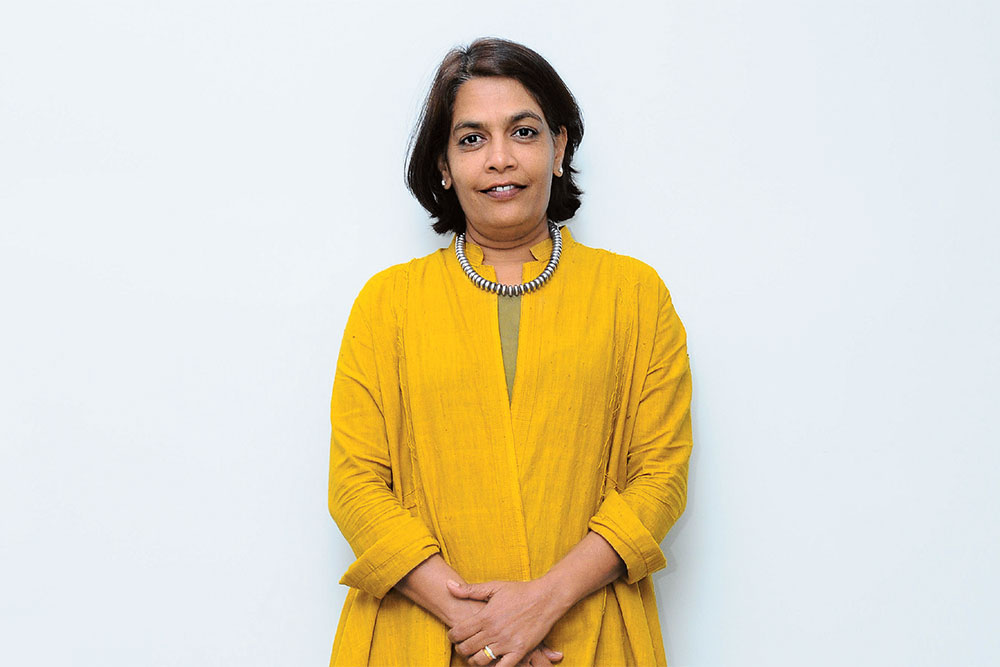Just before I walk into the airy Bengaluru office of Bharati Jacob, co-founder and partner, Seedfund, I spot her calmly navigating what seems to be a business-related conference call. It is only at the end of the conversation that I realise that Jacob was, in fact, in the middle of an animated — and positively frustrating — discussion with government authorities over a bureaucratic hassle. While others might admire the grace under pressure that she exhibited, Jacob explains that this behaviour often worked against her on the professional front.
“There is a common perception that for a woman to be seen as high-achieving, she needs to be in-your-face aggressive. If you don’t come across as such, then you’re often not taken seriously; nobody ever praises a woman by calling her the strong, silent type. One woman even told me with a smile, ‘You are very unaggressive’; the expectation being that you have to be aggressive to show ambition,” says Jacob. Of course, Jacob’s professional career path has been anything but unambitious, although she calls herself an accidental investor and entrepreneur. An XLRI graduate, Jacob went to the Wharton School, University of Pennsylvania, to pursue an MBA in marketing.
With her mind firmly set against studying finance, Jacob was in for a surprise when she attended professor Jamshed Ghandhi’s classes on the subject. “He taught us that finance is not just about numbers: there is a huge amount of psychology involved in the way public, private and financial markets behave,” says Jacob.
Though she worked with Northwest Airlines over the next two years to pay off student loans, Jacob was keen on moving back to India to work with venture funds. Unfortunately, because this was much before reverse brain drain became a trend, her return was met with more consternation than appreciation. “People would ask me, ‘Why did you come back? Did something happen, is something wrong? Did you have visa issues?’ None of my American friends ever questioned why I would want to go back to my own country; all my Indian friends did,” she says.
Starting trouble
This is when Jacob’s assumption that her Wharton MBA would get her a foot in the door with employers started falling apart. “I realised that people look at you differently because you have come back. In those days, there was only one venture fund and I was quite keen on working with it. But I was told that ‘You belong to so-and-so batch and we already have someone from that batch’. In those days, the corporate world believed that if you spent 10 years in sales and wanted to shift to finance, you must start all the way at the bottom; your experience didn’t matter,” she says.
In 1993, Jacob managed to get a job with investment banking joint venture Lazard Credit Capital, launching and managing their Bengaluru and Chennai offices. But three years later, Lazard took over as majority owner and the firm decided to shut some of its five offices in the country, including the ones she had started. Jacob was faced with the choice of moving to Mumbai at a time when she had to look after her young daughter and ill father. “Given that and the fact that investment banking was already a bit of a hustle, I decided to take some time off,” she says.
Jacob did that for three years before friend Saurabh Srivastava — who knew her inclination towards venture funds — and Pravin Gandhi came calling with plans for a fund called Infinity Ventures. Her daughter having started school, Jacob decided to take the plunge in 2000, turning the $35-million Infinity Ventures into one of the most successful funds of its vintage. Over time, her conversations with Pravin Gandhi shifted to early-stage funds and the duo decided to bring Mahesh Murthy on board and start Seedfund in May 2006.
“I have done two funds thus far and I think we have been successful in terms of cash realised for investors,” says Jacob. She adds that the fund’s investment strategy is a result of the collective wisdom the co-founders drew from earlier outings. They sit with each start-up and whittle down funding requirements, knowing that too much money might put undue pressure on entrepreneurs. That hardly means the fund skimps on cash: Jacob patiently talked RedBus’ founders through their business plan, revising it several times till it touched ₹3 crore from ₹30 lakh. This wisdom also guided exits, with the fund picking market leaders since it was in it for the long run; as a result, Seedfund exited auto classifieds start-up Carwale with 9X return in four years.
Ask Jacob if her sabbatical was a tough decision to make and she insists that it would have been harder had she been working in a traditional role at a corporate. “I think they would have given me a much lower position on my return,” she explains. Jacob also believes that there was some degree of serendipity involved in her return. “When the opportunity arose, I didn’t say no, I didn’t say, ‘Let me think about it’. I said this is what I have always wanted to do, let me take it up. At a large corporate, I may have faced some difficulties and may have had to knock on many doors. But our industry is a little different: we value diversity of experience,” she says.
It helped that she had the full support of her parents and husband Jacob Kurian, a partner at PE firm New Silk Route Advisors, with whom Seedfund shares office space. “I think support is very important and it is a two-way street. In the early years of marriage, one has to lay down some ground rules. Luckily for me, my husband was a lot more open-minded. He never stopped me from working, maybe also because he thought I would climb walls if I didn’t work,” she laughs. While Jacob’s spouse firmly believed in her right to realise her full potential, she says women must nonetheless draw up some invisible rules.
Gender bender
Jacob says she deals with gender-related issues at work by pretending they don’t exist. “I’ve had people hit on me in a professional environment, but I think that is more about harassment. I just move on and ignore such inappropriate behaviour.” Jacob thinks her firmly middle class upbringing may have helped her ignore such issues. “I was brought up to think that I can do anything. From an early age, because there were only girls in the family, I was sent to do things that — perhaps in other families — boys would have done, such as going to the bank or the post office. I was given a lot of independence and trust from an early age. Even today, my mom behaves the same way. So, I never worried about whether I was being discriminated against or not,” she says.
While Jacob is enthused about the rise in the number of women entrepreneurs in the market today, she thinks there is still a lot of ground to cover. “I think we’re at 10% participation right now, which is better than the 1-2% figure from the nineties,” she says. But thanks to the rise in confidence among young girls and the rising number of entrepreneurs in general today, the share of women in business is slowly going up. “I hope it would make a quantum leap, though; I wish we could get to 50% women founders — that would be a great day for the entrepreneurial world and India,” Jacob adds.
The presence of role models such as Kiran Mazumdar-Shaw of Biocon and several others helps as well, Jacob explains. Has she seen more wellness- and health-related companies being launched by women than other ventures, we ask. Jacob explains that this is another subconscious bias that we all play into. “We need to celebrate the fact that women are running businesses that they enjoy and like, whatever be the reason,” she says.
No ceiling
Given that there are other explicit biases that work against women — ranging from job interview questions about marriage or kids to questions about the competence of attractive women — Jacob believes the key is to take it as a given and keep working harder. “You have to do what you want to do; these biases will disappear over time. I’m sure there have been instances when people have felt that since my co-founders were men, they must be senior to or more important than me. My point is, why worry about that and fight a perception battle? Instead, work hard, do what you enjoy, show perseverance and passion and you will get where you want. Anything you have to prove should be to your own self,” she insists. Jacob says that while she isn’t denying the presence of a glass ceiling in large corporates, her advice is to ignore it and not waste energy thinking about it.
And she has seen enough instances of hard work paying off. “Years ago, at Lazard, we had a very capable office manager. She worked hard, went for an after-hours job and moved on to GE’s legal department. She learnt law along the way and, today, she is the legal counsel there. This just proves to me that dedication can get you what you want,” she says.
Encounters with such inspiring people have enriched her life, Jacob says, adding that she has learnt valuable lessons even from the people she doesn’t agree with. Of course — like everyone else — Jacob, too, has had her ‘why am I doing this’ moments. “I’m sure everybody gets these doubts. It takes me a while to snap out of it, but I keep telling myself that I can do it. Then I break down the situation into smaller bites so that I can get past the hump. Family support, an inherent belief in myself and an ego that doesn’t allow me to lose has ensured that my bad phases never last beyond a day or two,” she avers. All of which just goes on to prove that old adage of how you can never keep a good woman down.












 Just one email a week
Just one email a week